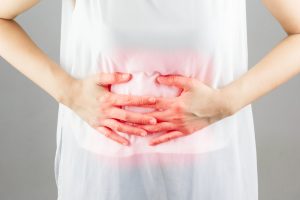Around 1 in 5 Australians will experience the symptoms of irritable bowel syndrome (IBS) at some point in their life. Those who are unfortunately enough to have suffered the symptoms know just how uncomfortable and irritating they can be.
What is IBS?
IBS, sometimes termed ‘spastic colon’ or ‘irritable colon’, is a condition affecting how the bowels function. The symptoms of IBS can be embarrassing and inconvenient, however don’t cause any permanent damage to the bowel.
While the exact cause of IBS is unknown it can be triggered by infection, stress, food intolerance or certain medication. It’s more common in women than men and typically develops in late teens or early twenties.
Symptoms of IBS
The most prominent symptom of IBS include abdominal pain and change in individual bowel habits. However, symptoms can also include:
- Reoccurring diarrhoea or constipation
- Bloating
- Pain or discomfort relieved by passing wind or going to the bathroom
- Mucus in the stool
- Nausea
Treating IBS
IBS cannot be cured, but symptoms may be managed through lifestyle changes, such as:
- Changing your lifestyle and diet.
- Review any medication which may be aggravating your symptoms.
- Maintaining a healthy diet.
- Increasing your dietary fibre intake.
- Managing stress if it seems to trigger symptoms.
For temporary relief of symptoms some may choose to take painkillers, anti-diarrhoeal medicines or antispasmodics.
IBS Diet
One of the easiest and most popular ways to reduce the occurrence of IBS symptoms is through dietary changes. While there is no ‘one size fits all’ IBS diet, avoiding certain foods may help. Some foods to try avoiding:
- Alcohol
- Caffeine
- Spicy foods
- Foods high in fat
Try keeping a food diary for a few weeks to see if there are any foods that trigger your symptoms. If you identify certain triggers, discuss these with your doctor or a dietitian before modifying your diet.
Australian researchers have developed the FODMAP diet to help control IBS symptoms. It involves restricting the intake of certain carbohydrates, more information can be found on the Monash University website.





